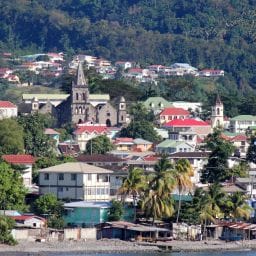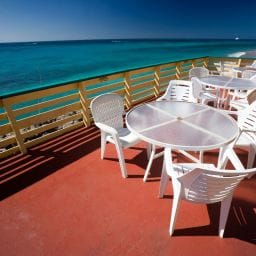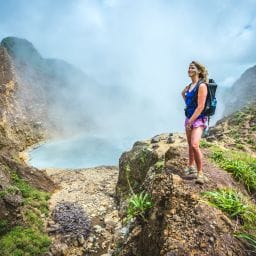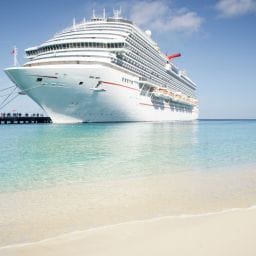
Hello, I’m Carlo — a dreamer, a digital nomad, and the heart behind ParadiseDominica.com. When I first arrived here from Italy, I was overwhelmed not just by the island’s raw beauty, but by all the practical things I needed to learn. From money and plugs to customs and health tips, there’s a lot to know! That’s why I’ve put together this complete Dominica visitor information guide to help you feel prepared, relaxed, and ready to enjoy every moment.
Money and Banking in Dominica
Currency (Eastern Caribbean Dollar)
Dominica uses the Eastern Caribbean Dollar (XCD), which is pegged to the US dollar (1 USD ≈ 2.7 XCD). While some tourist places accept USD, local markets and shops expect XCD. I recommend exchanging a bit of cash at the airport or a local bank to make your life easier.
ATMs, Cards, and Cash Tips
ATMs are available in Roseau and major towns, but don’t expect them in rural areas. Bring Visa or Mastercard (American Express is less accepted), and keep some cash on hand, especially for small vendors and taxis. Trust me — I’ve been stuck once without enough cash in a small village and had to rely on the kindness of a stranger!
Currency Exchange and Where to Go
Exchange services are available at banks and some hotels. Avoid unofficial exchangers. Local banks include National Bank of Dominica, First Caribbean International Bank, and Royal Bank of Canada.
Customs, Immigration, and Visitor Entry
Passports, Visas, and Tourist Stays
Most visitors, including from the EU, US, and UK, do not need a visa for stays up to 21 or 30 days (check your country!). You’ll need a valid passport with at least six months’ validity and a return or onward ticket. I always recommend checking the latest updates before traveling, as entry rules can change.
What You Can and Cannot Bring
You can bring personal items, but there are restrictions on fresh food, plants, and certain electronics. Duty-free allowances include alcohol and cigarettes within set limits. When in doubt, declare it!
Health and Safety in Dominica
Recommended Vaccinations and Health Advice
While no vaccines are mandatory, I recommend hepatitis A and B, typhoid, and tetanus boosters. There’s no malaria risk, but mosquito repellent is essential to avoid dengue and chikungunya. Bring any personal medications, as pharmacies might not stock international brands.
Safety Tips for Travelers
Dominica is considered safe, but use common sense: avoid isolated areas at night, lock your accommodations, and be cautious when hiking alone. I personally feel very safe here, but it’s always wise to stay alert.
Electricity and Plugs in Dominica
Dominica uses 220–240V with British-style Type D and G plugs. Bring an adapter if you’re coming from North America or mainland Europe. I learned this the hard way — my first night I couldn’t charge anything until I got to a hardware store the next day!
Phone Service and Internet Access
SIM Cards and Mobile Networks
Local SIMs are available from Digicel and Flow. You’ll need an unlocked phone. Coverage is good in towns but patchy in the mountains. Buy data packages to save money on roaming — trust me, I found out the expensive way during my first week!
Internet and Wi-Fi Availability
Wi-Fi is available in hotels, guesthouses, and some cafes, but speeds can vary. If you work online (like me), consider staying somewhere with reliable internet or using a local mobile hotspot as backup.
Emergency Numbers and Important Contacts
Hospitals, Police, and Fire Services
The main emergency number is 999. The Princess Margaret Hospital in Roseau is the central hospital. For police, dial 911. Always have your travel insurance details handy.
Embassy and Consulate Information
There are few foreign embassies on the island; most consular services are covered by embassies in nearby Caribbean countries. Check your country’s foreign office website for details.
Time Zone, Weather, and Seasons
Time Zone
Dominica follows Atlantic Standard Time (UTC -4) year-round. There’s no daylight saving time, so plan your calls or meetings accordingly if you’re working remotely!
Seasonal Variations and Best Times to Visit
The dry season runs from December to May, with the wet (and hurricane) season from June to November. I love the dry season for hiking, but the wet season offers lush, dramatic landscapes and fewer tourists.
What to Pack
Bring lightweight clothing, a light rain jacket, sturdy hiking shoes, and — always — mosquito repellent. For the beach, a good sun hat and reef-safe sunscreen are musts.
Transportation and Getting Around
Taxis, Buses, and Rentals
Taxis are common in towns but can be pricey. Local minibuses (with green license plates) are cheap and fun, though they follow flexible schedules. Renting a car is great if you’re comfortable with winding, narrow roads — remember, they drive on the left here!
Driving Tips and Road Conditions
Roads can be steep and challenging. I recommend renting a 4×4 if you plan to explore off the beaten path. Always drive carefully, especially after rain.
Language and Local Etiquette
Official Languages and Useful Phrases
English is the official language, but you’ll hear Creole (Kwéyòl) widely spoken. Learning a few greetings — like “Bonjou” (good morning) — will earn you smiles!
Cultural Tips and Respectful Behaviors
Dominicans are friendly and polite. Dress modestly in towns (cover up swimsuits), ask permission before photographing people, and greet shopkeepers when entering stores. Trust me, it makes a difference!
Business Hours and Public Holidays
When Shops and Restaurants Are Open
Shops usually open from 8 a.m. to 4 p.m. Monday to Friday, with reduced hours on Saturdays. Restaurants often stay open later, but smaller places may close early.
Major Public Holidays
Important holidays include Carnival (February/March), Independence Day (November), and Christmas. Expect lively celebrations and some closures around these dates.
Tipping Customs and Payment Methods
Where Tipping Is Expected
Tipping is appreciated but not mandatory. In restaurants, 10–15% is standard if service is good. For taxis and guides, rounding up is a nice gesture.
Cash or Card: What’s Best?
Cash is king in small places, but cards are accepted at major hotels, restaurants, and shops. I suggest carrying both to be safe.
Carlo’s Final Thoughts for Visitors
Dominica is not just a place — it’s a feeling, a rhythm, a living connection to nature and people. While these Dominica visitor information tips will help you prepare, the real magic happens when you let go of the checklist and immerse yourself. Breathe in the rainforest air, swim in the waterfalls, and greet the locals with a smile. Welcome to Dominica — your adventure awaits!
For more guides, check out our posts on the Waitukubuli National Trail and the Kalinago Territory.







[…] Internal link: Don’t miss our Dominica Travel Guide for tips on where to stay, eat, and […]